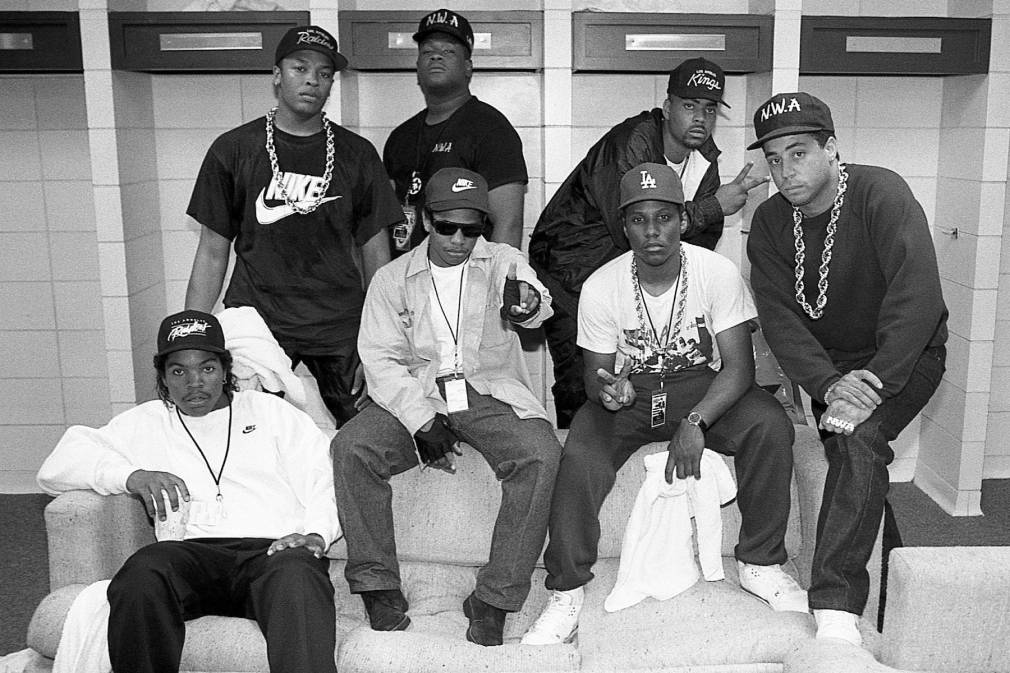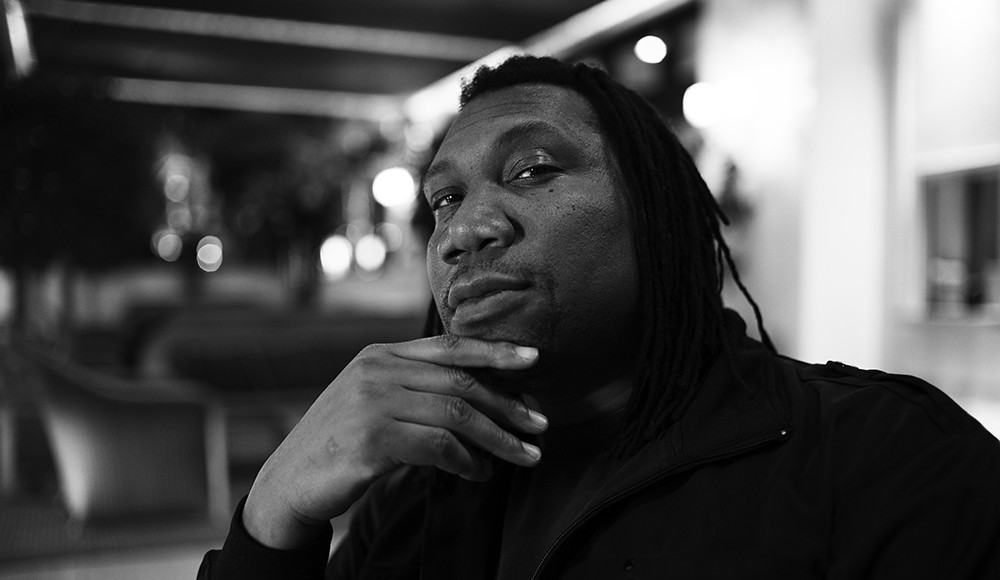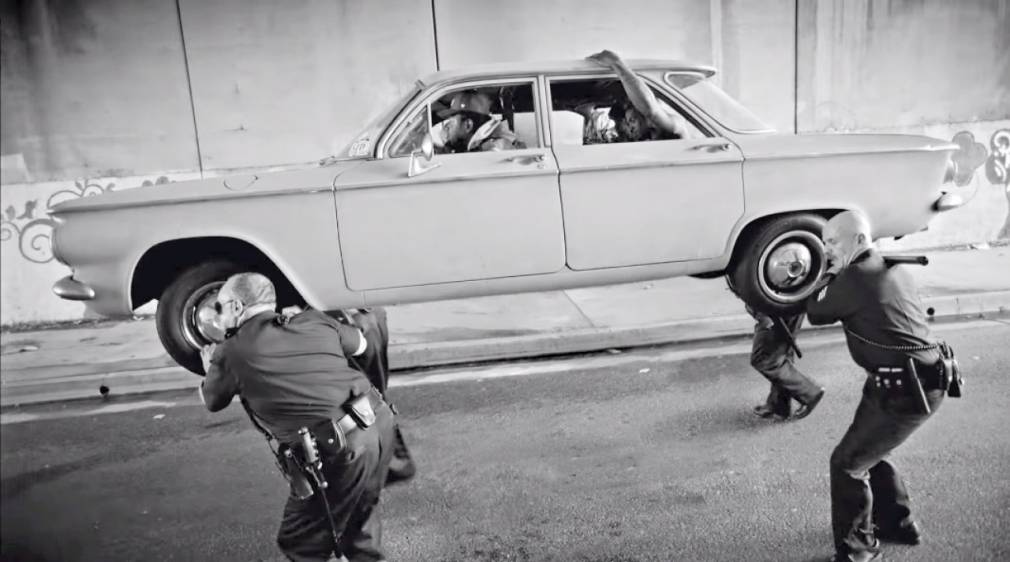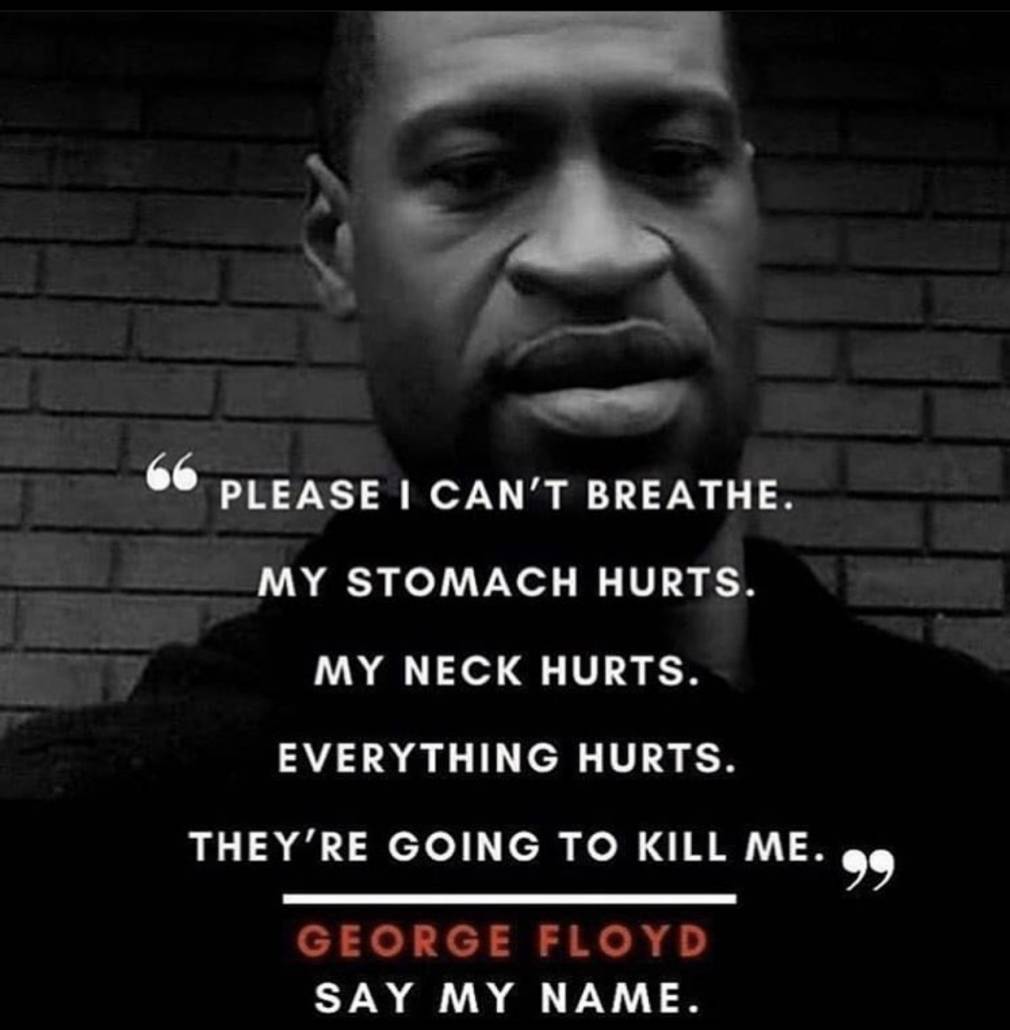In the wake of the unjust murder of George Floyd, we look at hip-hop’s power of social commentary and political change regarding police brutality towards African Americans.
The most recent killing of George Floyd on May 25th has sent Minnesotans into riot mode and left Americans and those looking on from abroad in shock. Minnesota police responding to a call about the use of counterfeit money from a local marketplace proceeded to detain and restrain George Floyd, with one officer placing his knee on Floyd’s throat. On the ground and handcuffed, Mr. Floyd pleaded with the officer gasping, “I can’t breathe” (a terrifyingly similar vision to the death of Eric Garner in 2014), but it was to no avail. Floyd later died in custody.
The digital age has done its part to put the grotesque violence and abuse of powers on the internet for all to see, but the excessive use of force and tragically unnecessary murder of detained black men is nothing new. Police abuse has been a focal point for black activists in all parts of the United States for some time. It has been the subject of film, music, and sports for as long as black artists and athletes have had a platform, not to mention the politically active groups like Black Lives Matter.
Here we’re going to explore the lessons of outrage we can harbour from the sad history of police violence against black citizens through the music of some of America’s most prized artists.
Fuck Tha Police
In 1988 Ice Cube shook the American consciousness with his track “Fuck Tha Police” on N.W.A.’s album Straight Outta Compton. In the intro the group flips the script, playing the role of judge (Dr. Dre) and prosecutor (Ice Cube, MC Ren, and Eazy-E) to put the L.A. County Police Department (which has a long history of corruption and racial profiling) on trial.
“Fuck the police com-in’ straight from the underground!
A young nigga got it bad ‘cause I’m brown
And not the other color, so police think
They have the authority to kill a minority”
The line has become the stuff of legend and inspired copycat riffs throughout hip-hop including acts like Bone Thugs-N-Harmony, J Dilla, and Boosie Badazz. Conservative America and law enforcement were less than enthusiastic about the track. The group received menacing letters from the FBI and were arrested in Detroit in 1989 for performing the song at the Joe Louis Arena.
MC Ren described the frustration that fuelled Ice Cube’s track to HipHopConnection in 1989 saying, “when you get stopped for a traffic ticket you’ll most probably be slammed down on the street corner like you robbed a bank.”
Therein lies the political power of “Fuck Tha Police”. To be heard, Ice Cube didn’t respond with a timid meekness, but delivered a message with as much carnal violence and anger as the police that frisked unwarranted black men. It took something so explosive, so authentic, and so filled with slur and violence to wake up and empower a community subjugated to long term discrimination. In the vain of a Malcolm X or recently passed gay activist Larry Kramer, Ice Cube cut straight to the truth, fighting fire with fire, and never mincing his words.
Ice Cube started a conversation, albeit a hot and controversial one, with the community. N.W.A. was representing all their peers who experienced profiling and citizens like Rodney King who were unjustly beat half to death without repercussion. “Fuck tha Police” is protest at its finest.
Speaking with Billboard in 2018 about the legacy of the song and its impact on police brutality in L.A. Ice Cube responds, “I think it’s the same. What we got to do is hold these dudes more accountable. We need body cameras.” Ice Cube may be right in his pessimism and police brutality still dominates much of our psyche, however since 2020, the L.A. County Sheriff’s department is legally required to wear body cams and release all footage to the public.

Sound of da Police
KRS-One (Knowledge Reigns Supreme Over Nearly Everyone) took a different approach for his police protest on his second single off his freshman album, “Sound of da Police” released 5 years after “Fuck tha Police”. KRS-One is known for his political thought and “conscious” raps, which is demonstrated with swag and ease in “Sound of da Police”.
KRS-One attacks corruption, the legacy of slavery, and the broad hand of justice in every bar. He starts by making allegations into the history of drug trafficking within the Brooklyn P.D. :
“I know this for a fact, you don’t like how I act
You claim I’m sellin’ crack, but you be doin’ that”
He then creates an allegory between officer and overseer in a brilliant use of wordplay and demonstration of phonetics:
“Take the word overseer, like a sample
Repeat it very quickly in a crew, for example
Overseer, overseer, overseer, overseer
Officer, officer, officer, officer
Yeah, officer from overseer”
Finally he highlights the moral hypocrisy of imposing law on colonised land:
“Change your attitude, change your plan
There could never really be justice on stolen land”
The track can be broken down at every turn and KRS-One comes through like a student ready for a high profile debate. KRS-One has done his homework, and when he attacks injustice he picks it apart one folly at a time. The question of police violence runs deep, and KRS-One manages to move past the righteous anger of Ice Cube and into the concrete nature of the struggle, addressing point by point the hypocrisy and corruption that is innate in police’s interactions with black individuals.

Made You Die / Be Free / Don’t Shoot / Hands Up
Fast forward to the 2010s and while the black community made strides in police brutality and integration, America was soon to hit a series of tragedies, losing young black men to unnecessary violence. These new stories, often captured on a cell phone or video camera, became individualised in the vain of Rodney King. They were then abstracted to the larger issue of systematic racism empowering the Black Lives Matter movement and a series of protests to combat prejudice.
These next waves of songs became tributes. The first of which was the heartrending story of Trayvon Martin. On February 26th 2012 Trayvon, then 17 years old, was walking home from a convenience store after buying some Skittles and iced tea when he was confronted by George Zimmerman of the neighbourhood watch who claimed Trayvon looked, “suspicious”. Zimmerman confronted Trayvon, an altercation ensued, and Trayvon was eventually shot and killed. Zimmerman was found innocent and acquitted of all crimes citing Florida’s “stand your ground” law.
While the incident didn’t directly involve police, it spoke to the same bias and imposition of white authority applied by a neighbourhood watch and the institutional bias that failed to prosecute a clear cut murder. Mos Def and Dead Prez were quick to respond, using their masterful lyricism to pay homage to Trayvon in “Made You Die” :
“Standard answer it was random police movement
Inconclusive confusion, the present news clips, callous bullshit
Every talking head is clueless, man they stuck on channel stupid” – Yasiin Bey
The story of Trayvon is also immortalised in Frank Ocean’s “Nikes” in which Ocean is able to connect Trayvon’s experience to all of black America singing, “RIP Trayvon, that nigga look just like me”.
Next came Michael Brown, who was shot by police in on August 9th 2014 after an altercation ensued from a traffic stop in Ferguson, Missouri. As Michael Brown attempted to flee the scene, understandably frightened by the altercation, he shouted “don’t shoot” and was then gunned down by officer Darren Wilson. Officer Wilson was eventually acquitted on self defence. The city of Ferguson rose up in protest when interactions with law enforcement became tense (often provoked by the police) and violence ensued, leading to days of riot, fires, curfews and riot squads patrolling the streets.
In response J. Cole released “Be Free” incorporating eye-witness accounts into the track between hooks of desperation. The Game also came through with an all-star cast of artists to memorialise Mike Brown on “Don’t Shoot” featuring DJ Khaled, 2 Chainz, Fabolous, TGT, Swizz Beatz, Yo Gotti, King Pharaoh, Curren$y, Problem, Rick Ross, Wale and Diddy. The song covered the deep history of political injustice from Emmett Till to the prison industrial complex. Purchase of the song on iTunes sent funds directly to the Mike Brown charity fund.
Songs have been made to memorialise a slew of other unjustified shootings, but the list is demoralising and inexhaustible. What is noteworthy is hip-hop’s approach towards storytelling, using individual tragedy to create a broader conversation. This method seemed to resonate with the American public and these tragedies didn’t go without political consequences. Barack Obama, in the wake of the Ferguson unrest asked for $263 million in funding for police body cameras.

We Gon’ Be Alright
Finally, Kendrick Lamar brings the conversation full circle as hip-hop moved through its stages of grief. Ice Cube began with the rage, KRS-One bargained with the institution, the 2010s felt the depressive weight of individual stories then Kendrick Lamar comes through with his anthem “Alright” off of his 2015 album To Pimp A Butterfly to bring a sense of acceptance, hope, and inspiration. The song quickly became the soundtrack to the Black Lives Matter movement and the refrain went viral with groups posting videos singing the chorus in a beautiful display of empowerment in the face of adversity.
“We gon’ be alright
Do you hear me, do you feel me? We gon’ be alright”
At the 2015 BET Awards, Kendrick performed the song on top of a police cruiser to further cement the symbolic meaning of the song in relation to police violence. The song’s music video is also a visual testament to the song’s power and meaning.
Kendrick has long been seen as a voice for his generation. His poetic skill and his fearless approach have given him a well deserved reputation as a kind of hip-hop prophet. What is most impressive is Kendrick’s sensibility. When so many are outraged, depressed and demoralised, Kendrick delivers a message of hope and inspiration that fuelled the fires of resistance to perfection. His lyrics by no means induce a pacifism or apathy, they are filled with condemnation and activism, but the central theme rings true :
“I didn’t wanna self-destruct
…So I went runnin’ for answers”
Kendrick won the Grammy for Best Rap Album and Best Rap Performance for “Alright” and the song continues to spin in political circles today. One could say the anthem is in more need than ever considering the political climate of the United States and the recent news of George Floyd.
I Can’t Breathe
Now that we see the public taking to the streets despite a global pandemic, rallying under #Icantbreathe (often written across surgical masks), and making broad condemnations of racial injustice, where will U.S. hip-hop take us next ? Will there be an artists who steps up to tell the story of George Floyd ? Will we repeat the vicious cycle of rage to hope ? In many ways it depends on how the American institutions respond to the violence, and what measures are taken to mitigate the injustice that is far too omnipresent.
Nonetheless, there exists a rich legacy of hip-hop ready to inspire, tapping into the spectrum of emotions that are triggered by police brutality. Whether it’s Ice Cube or J. Cole, Frank Ocean or KRS-One, there is a sound and a message that can help fill the void left in the anger and mourning of innocent life lost. So turn up your speakers and get some cathartic relief as we honor and memorialise George Floyd, and all the innocent lives lost to the sad reality of racism and police brutality in America.
For those interested in activism, feel free to review the ACLU’s Community Action Manual on Fighting Police Brutality or participate in the funding the official George Floyd Memorial.





